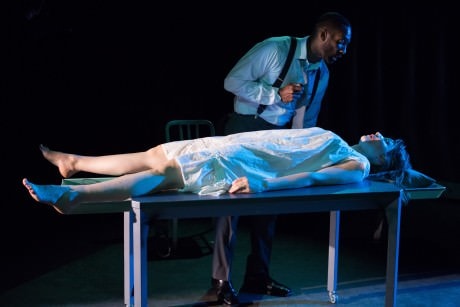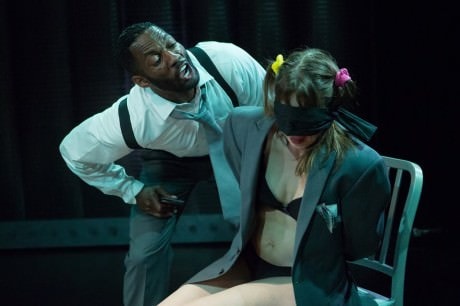Radha Bharadwaj’s Closet Land is not for the faint of heart.
At least, not how it is done by Rick Hammerly of Factory 449 at the Anacostia Arts Center, where audience members walk into a closet, hear the footsteps of their torturers encircle them, feel the breathing on the back on their necks, the sweaty fingertips traversing their bellies along the rib cage and up toward the clavicle, and then hear the voices whisper to them: “Sign the paper, just sign.”
For David Siegel’s review of Closet Land, click here.
Closets, on the other hand, for whom are they?
For no one, really, unless one can hang on a hook or slip comfortably around a hanger. For he or she who find him or herself in one, however, Ms. Bharadwaj’s intense mental gyroscope offers a cure, of sorts.

You can get out of the closet by accepting the lie, the lie about why you are in the closet to begin with. That’s the Kafkaesque premise of Bhadadwaj’s script, and it is that premise that saves Closet Land from being a torturous exposé on torture, political, personal, or otherwise.
It is that catch-22 that makes Closet Land ripe for our time.
When Closet Land, the independent film, came out in 1991, the torture of political prisoners was something those other folks did. You know the ones: the North Koreans, the Cubans, the Iranians, the Chinese, the Russians. Many of the film’s critics complained that they already knew those folks tortured people, so why make a film when, as Roger Ebert wrote, “Their movies are never seen by the torturers, and bring no fresh news for the good of heart, who are already well aware of the corrupted world we inhabit.”
Since 1991, the first Gulf War (code named Operation Desert Shield), and then 9/11 and the War in Afghanistan, and the Second Gulf War, the Patriot Act, Prism, and then with the widespread use of surveillance and cell phone video that have captured countless incidences of police and prison violence and… the lie that we have to sign our name to is the lie that “it doesn’t happen here,” that America isn’t a part of Ebert’s “corrupted world” where torturers are the lawyers and a Vice President who celebrates our Exceptionalism.
If we only sign our names on the dotted line then we can get out of the closet and once again lead normal, happy, even if artificial, lives.
So, once again, who belongs in a closet?
Anyone who won’t sign their name on the dotted line and accept the lie about who they are.
Are there advantages to not accepting the lie? Hardly, other than the grim knowledge that you’ll have a faint glimmer of the truth, about yourself, your world, your government. And the rewards of signing are bountiful: success, fame, fortune.
Currently, Baltimore is in an uproar: Freddy Gray, a “27-year-old African-American man died Sunday from spinal injuries, one week after Baltimore police arrested him. His family and attorney say his voice box was crushed and his spine was ’80 percent severed at his neck.’ A preliminary autopsy report showed Gray died of a spinal injury. Video shot by a bystander shows Gray screaming in apparent agony.” Apparently, or possibly, the police killed him using a popular form of torture known as the “rough ride.”
“In May, 2010, Kalief Browder, a sixteen-year-old high-school sophomore, was arrested in the Bronx for allegedly stealing a backpack. He insisted that he was innocent….” Three years later, in May 2013, after years of incarceration at Riker’s Island, where he refused to sign a lie admitting his guilt, the charges were dropped and he was released from the closet, a closet in which he was beaten by guards and inmates alike.
Watch a video of the incidents here.

So who belongs in the closet, and who gets out?
The beauty of Closet Land is that its brutality is as much metaphor as it is reality.
Electro shock, waterboarding, genital violation, toenail pulling, sensor deprivation, etc., are committed by governments that want to silence all agitation, mental or physical.
Artists of all kinds have been accused of spreading dangerous ideas; Chilean writer Ariel Dorfman in How to Read Donald Duck even accused Walt Disney, that loveable fascist, of spreading capitalist propaganda in Latin America. No worries though; he spreads the same ideas in North America to North American children (and adults). Remember the Lion King, the movie and Broadway show.
And the psychological trauma of childhood rape leaves scars deeper than razor wounds.
Closet Land, however, allows its closet to be inhabited by any and everyone, for any and every reason each individual psyche can imagine: political, personal, cultural, irrational, heroic.
This two-person show with Sara Barker (woman) and David Lamont Wilson (man) won’t let you not look. It won’t let you not wonder why doesn’t she just sign that damn paper: “I would have twenty minutes ago, because I just want to be happy.”
The only question that remains is: Is living a lie worth the fame, fortune, and success that might follow?
Or isn’t it?
Running Time: 90 minutes, without an intermission.
Closet Land plays through May 10, 2015 at the Anacostia Arts Center – 1231 Good Hope Road, SE, in Washington, D.C. For tickets, purchase them at the door, or online.
Note: Closet Land is for Mature Audiences. It’s not suitable for children. It contains violence, explicit language, and sexual content.





